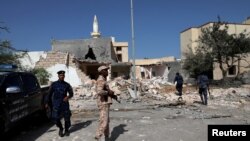ອົງການນິລະໂທດກໍາສາກົນ ຊຶ່ງເປັນກຸ່ມປົກປ້ອງສິດທິມະນຸດ ກ່າວວ່າ ຕົນມີຫລັກຖານ
ທີ່ອາດເປັນການກໍ່ອາດຊະຍາກຳສົງຄາມ ໂດຍພັກຝ່າຍຕ່າງໆທີ່ພວມຍາດແຍ່ງກັນເຂົ້າ
ຄວບຄຸມ ນະຄອນຫຼວງຕຣີໂປລີ ຂອງລີເບຍ.
ຢູ່ໃນລາຍງານສະບັບນຶ່ງທີ່ນຳອອກເຜີຍແຜ່ໃນວັນອັງຄານວານນີ້ ຢູ່ຫ້ອງການກຸ່ມປົກ
ປ້ອງສິດທິມະນຸດດັ່ງກ່າວໃນນະຄອນຫຼວງລອນດອນ ກ່າວວ່າ ກຳລັງສູ້ລົບເຫຼົ່ານີ້ໄດ້
ສັງຫານ ແລະເຮັດໃຫ້ມີຜູ້ໄດ້ຮັບບາດເຈັບທີ່ເປັນພົນລະເຮືອນ ຈຳນວນນຶ່ງ ໂດຍທຳ
ການໂຈມຕີຢ່າງບໍ່ເລືອກໜ້າແລະໃຊ້ອາວຸດ “ຮ້າຍແຮງຕ່າງໆ ທີ່ບໍ່ມີຄວາມແມ່ນຢຳ”
ໃສ່ເຂດເທດສະບານ ທີ່ມີປະຊາຊົນຢູ່ຢ່າງໜາແໜ້ນ.
ທ່ານບຣາຍອັນ ແຄສເນີ ທີ່ປຶກສາວິກິດການອະວຸໂສຂອງອົງການນິລະໂທດກໍາສາກົນ
ກ່ຽວກັບເລື້ອງອາວຸດ ແລະການປະຕິບັດງານທາງທະຫານກ່າວວ່າ “ມີພົນລະເຮືອນ
ຈຳນວນນຶ່ງໄດ້ຖືກສັງຫານ ແລະບາດເຈັບ ໃນຂະນະທີ່ທັງສອງຝ່າຍນຳໃຊ້ທຸກອາວຸດ
ທຸກຢ່າງ ນັບແຕ່ລູກຈະຫຼວດທີ່ບໍ່ມີການນຳພາທິດທາງແຕ່ ສະໄໝກາດາຟີ ໄປຫາເຮືອ
ບິນສະໄໝໃໝ່ທີ່ບໍ່ມີຄົນຂັບ ທຳການຍິງລູກສອນໄຟທຳການໂຈມຕີ ທີ່ເທົ່າກັບເປັນການ
ກໍ່ອາດຊະຍາກຳສົງຄາມ.”
ອົງການນິລະໂທດກໍາສາກົນ ກ່າວວ່າ ບັນດາສະມາຊິກຂອງຕົນໄດ້ທຳການສືບສວນຢູ່
ສະໜາມແບບລົງເລິກ ໃນທົ່ວເຂດແນວໜ້າ ນັບແຕ່ໄດ້ເກີດການສູ້ລົບຢູ່ທົ່ວນະຄອນ
ຕຣີໂປລີ ໃນວັນທີ 4 ເມສາເປັນຕົ້ນມາ. ບັນດາຜູ້ສືບສວນໄດ້ໄປຢ້ຽມຢາມ 33 ບ່ອນ ທີ່
ຖືກຖີ້ມລະເບີດທາງອາກາດ ແລະທາງພາກພື້ນດິນຢູ່ໃນ ແລະອ້ອມແອ້ມນະຄອນຕຣີ
ໂປລີ ແລະໄດ້ສຳພາດພວກທີ່ເຫັນເຫດການ ບັນດາຜູ້ເຄາະຮ້າຍ ສະມາຊິກທະຫານ
ບ້ານ ພວກເຈົ້າໜ້າທີ່ທ້ອງຖິ່ນແລະພວກພະນັກງານການແພດ. ລາຍງານຂອງເຂົາ
ເຈົ້າພົບເຫັນວ່າ ມີພົນລະເຮືອນ 100 ຄົນໄດ້ເສຍຊີວິດ ຫຼືໄດ້ຮັບບາດເຈັບ ແລະ
100,000 ຄົນ ບໍ່ມີທີ່ຢູ່ອາໄສ.
ການສູ້ລົບໄດ້ເລີ້ມເກີດຂຶ້ນເວລາຜູ້ບັນຊາການທີ່ຕັ້ງຢູ່ທາງພາກຕາເວັນອອກຂອງ ປະ
ເທດ ນາຍພົນຄາລິຟາ ຮັຟຕາ (Khalifa Hafta) ໄດ້ສັ່ງໃຫ້ກອງທັບແຫ່ງຊາດລີເບຍ
ຫຼື LNA ບຸກໂຈມຕີ ນະຄອນຕຣີໂປລີ ເພື່ອໄດ້ຮັບ “ໄຊຊະນະ” ຕໍ່ ລັດຖະບານສາມັກ
ຄີຊາດ ຫຼື GNA ຂອງນາຍົກລັດຖະມົນຕີ ຟາເຢັດ ອາລ ຊາຣາສ (Fayez al Sarraj)
ທີ່ຄວບຄຸມດິນແດນທາງພາກຕາເວັນຕົກສຽງເໜືອຂອງລີເບຍ.
ກຸ່ມ GNA ເປັນລັດຖະບານລີເບຍ ທີ່ສະໜັບສະໜູນ ໂດຍສະຫະປະຊາຊາດ ແລະຮັບ
ຮູ້ໂດຍສາກົນ. ສ່ວນ LNA ໄດ້ສ້າງຕັ້ງຂຶ້ນຫຼັງຈາກສົງຄາມກາງເມືອງຂອງປະເທດໃນ
ປີ 2011 ທີ່ໄດ້ໂຄນລົ້ມອະດີດຈອມຜະເດັດການ ມົວມາ ກາດາຟີ ແລະປະເທດໄດ້ຕົກ
ສູ່ຄວາມວຸ້ນວາຍ. ກຸ່ມນີ້ແມ່ນຮວມທັງອະດີດກະບົດພ້ອມທັງບັນດາສະມາຊິກອະດີດ
ທະຫານໃນກອງທັບແຫ່ງຊາດຂອງລີເບຍ.
ອົງການນິລະໂທດກຳສາກົນ ກ່າວວ່າ ບໍ່ມີເຈົ້າໜ້າທີ່ຈາກຝ່າຍໃດຝ່າຍນຶ່ງໃນການຂັດ
ແຍ້ງ ໄດ້ຕອບຄຳຖາມຕ່າງໆ ກ່ຽວກັບລາຍງານທີ່ພົບເຫັນ.
ສະຫະປະຊາຊາດໄດ້ເຕືອນວ່າ ການເພີ້ມຄວາມຮຸນແຮງ ແລະວິກິດການມະນຸດສະ
ທຳທີ່ຊຸດໂຊມລົງຢູ່ໃນລີເບຍ ກຳລັງຜັກດັນໃຫ້ປະເທດດັ່ງກ່າວຫຍັບໃກ້ ຫຼືກັບຄືນໄປ
ສູ່ສົງຄາມກາງເມືອງຢ່າງເຕັມທີ່.
Human rights group Amnesty International says it has evidence of potential war crimes committed by warring parties vying for control of Libya's capital, Tripoli.
In a report issued Tuesday, the London-based rights group said combatants have killed and maimed scores of civilians by launching indiscriminate attacks and using "a range of inaccurate explosive weapons" in populated urban areas.
"Scores of civilians have been killed and injured as both sides use everything from Gadhafi-era unguided rockets to modern drone-launched guided missiles in attacks that could amount to war crimes," said Brian Castner, Amnesty International's senior crisis advisor on arms and military operations.
Amnesty says its members conducted the first in-depth field investigation across the frontline since fighting broke out across Tripoli April 4. The investigators visited 33 air and ground strike sites in and around Tripoli and interviewed witnesses, victims, militia members, local officials and medical workers. Their report found that 100 civilians were killed or wounded and 100,000 others were displaced.
The fighting began when the eastern-based commander, General Khalifa Haftar, ordered the Libyan National Army to move on Tripoli in a "victorious march" against the Government of National Accord (GNA) of Prime Minister Fayez al Sarraj, which controls territory in northwestern Libya.
The GNA is Libya's U.N.-backed and internationally recognized government. The LNA was formed after the country's 2011 civil war that overthrew former dictator Moammar Gadhafi and plunged the country into chaos. It includes former rebels as well as members of Libya's former national army.
Amnesty says no officials from either side of the conflict have responded to questions about the report's findings.
The United Nations has warned that escalating violence and a deepening humanitarian crisis in Libya are pushing the country closer to a return to the full-scale civil war.





